Infinite Possibilities On A Single Path
A peek into the life of Shwetha Sridharan is like delving into an adventure memoir—a colorful, playful, wholehearted and heartbreaking jigsaw of sights, smells, and sounds from around the globe, all woven together with  a robust conviction to understand and serve the world’s unseen communities.
a robust conviction to understand and serve the world’s unseen communities.
From a late-night childhood encounter with burglary to weekly conversations with the homeless in college, a Sri Lankan fisherman’s plea: “Don’t forget us,” and decision to quit her Silicon Valley tech job to spend a year with an NGO in Bangalore, Shwetha’s rich stories and Rahul’s insightful moderation filled, wrestled, and lifted our hearts in this Awakin Call.
Rahul Brown: In your early life, you grew up in Zambia. Can you share more about the community environment that you experienced in Zambia?
Shwetha Sridharan: My dad was one of the Indians that were recruited into Zambia for jobs in the seventies. I was there from about two or three months old until I was seven. It was a really formative time in my life, because I so much absorbed everything around me.
There were so many Indians that ended up in Zambia or other countries in Africa, they just sort of stuck together. My parents—everybody was so young. They were probably between the ages of 18-25. All the kids were super young, and we didn’t just have one mom, we had like five moms. Every time we had a birthday, our own mother wouldn’t make our cake. Some other mother would make our cake, but our mother would be busy making another cake for another kid’s birthday. So it sort of redefined what it meant for us to be in a family.
At the time, we obviously didn’t realize it, because we thought it was normal. Even though we weren’t blood related, we were related by proximity or the fact that we could speak the same language and we ate the same food. So I had tons of brothers and sisters. All the kids would take care of each other, and all the parents would take care of each other.
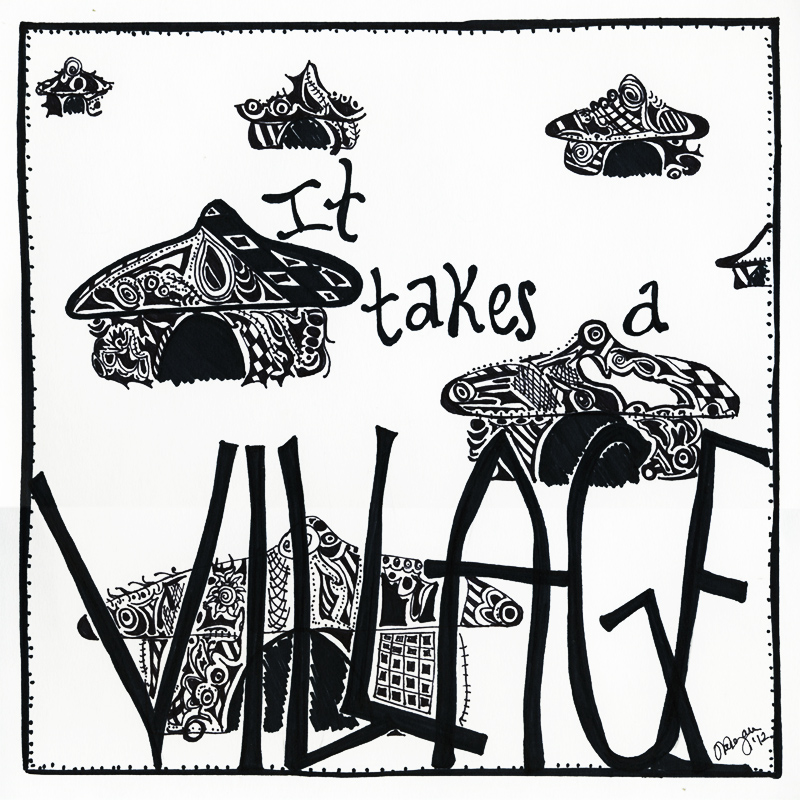 RB: It so much reminds me of the quote, “It takes a village to raise a child.” I also read an essay that you once wrote about some experiences of growing up in Zambia that gave you insights on race, poverty, and class. Could you share a bit about what you discovered around race, poverty, and class, and how that shaped your outlook?
RB: It so much reminds me of the quote, “It takes a village to raise a child.” I also read an essay that you once wrote about some experiences of growing up in Zambia that gave you insights on race, poverty, and class. Could you share a bit about what you discovered around race, poverty, and class, and how that shaped your outlook?
SS: Around the late 70s, early-80s, there was this resurgence of Indians into African countries. And because they were immediately coming into wealth (a lot of Indians came in as business owners, they started working for mining companies and came into banks), they would live well. So a lot of Zambians, a lot of Africans, had a lot of mistrust. Because these people from Indian countries were coming into these countries and taking their jobs and coming into wealth.
So many of this “extended family” that we were talking about faced attacks. They were robbed and hijacked all the time.
I have this image of this house that we lived in, when we were robbed one night. And it wasn’t a simple robbery. We lived in this house and a group of drunk men came in. They beat up the security guard (at the time, everybody had to have a security guard, you just didn’t know what would happen). They drugged our dog, and cut the electricity. They broke into our house and had broken glass in their hands.
We were sleeping at the time, and my dad—they cornered my dad and actually held a gun to his head. They said something like, “Get under the bed. Give us all your money.” They just demanded whatever he had on him. So my dad, being a calm person in general, obeyed them. They ushered my mom into another room with my brother and me, and just sort of locked her in there. So my mom was petrified, not knowing what was happening. They ended up not hurting any of us, but they took all of our cards, our electronics, and they sort of left the premises in such disarray and in such fright.
At the time, Zambian police weren’t really helpful. They were kind of really apathetic to the situation mostly because they didn’t have access to resources. If you called the Zambian police for help, they would say, “Can you come pick me up?” So they weren’t really reliable in terms of safety.
It’d be our neighbors who would help us out—our community or “extended family”. They heard what was happening, and they ended up coming over and making sure we were okay.
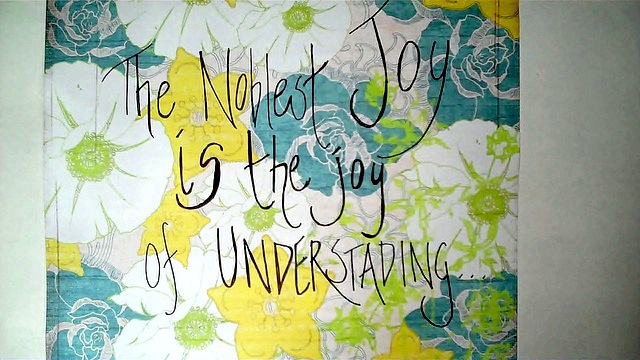
But I think that story made me realize how much of an inequality gap there was between us and the locals. And it wasn’t just by chance—I mean, it was by design. And sort of being exposed to stories like that from my dad at such a young age, it made me realize that that was something more to explore.
RB: What do you feel was different about your environment or your experience of that made you dive into those questions, instead of getting caught in the more negative narrative that sort of increases separation?
SS: It’s definitely because of how our parents handled it. Whenever they think about Zambia or talk about our time there, they talk about it with such awe and nostalgia. They never talk about all the bad stuff that they experienced—how hard it was in some ways, how scared they were at some times. These attacks on families is why my family left, why many families left. We became part of the Indian Diaspora. I think my parents and all the parents that we lived with—they talk about their time with such excitement. So they made us, the kids realized that experience was more than the bad parts.
RB: I want to fast-forward a bit to your college period, where you started volunteering for Habitat for Humanity and The Hunger Project. Why did you choose these particular projects, and what did you learn through the process of working with them?
 SS: The reason I got involved is they would have a table on campus, and I just sort of walked up to them and said, “What are the projects that you do?” So they made it very easy to be a part of, because they would just have one project. Habitat for Humanity would have one house that we’d go to. There was one homeless shelter that we would visit on Tuesdays or Wednesdays. They made it so easy for me to join, and it was something that I had resonated with because my mom, as a kid, she would take us to food banks and she would encourage us volunteer at the library. So it felt very natural in some ways. And I felt it was also a good way to spend my time.
SS: The reason I got involved is they would have a table on campus, and I just sort of walked up to them and said, “What are the projects that you do?” So they made it very easy to be a part of, because they would just have one project. Habitat for Humanity would have one house that we’d go to. There was one homeless shelter that we would visit on Tuesdays or Wednesdays. They made it so easy for me to join, and it was something that I had resonated with because my mom, as a kid, she would take us to food banks and she would encourage us volunteer at the library. So it felt very natural in some ways. And I felt it was also a good way to spend my time.
RB: In your post-college days you ended up encountering this organization called Be The Cause. Can you tell us a little bit more about them?
SS: Be The Cause is a nonprofit organization that doesn’t really have any specific leader or any specific platform, but its entire existence is to empower the me’s and you’s of the world who have a cause that they want to champion. So all you have to do is raise a cause and there will be volunteers ready to serve that cause. And the point is to reach within and find a deeper place of service and compassion through these different projects.
For me, Be The Cause was so much of a catalyst in deciding to switch from the for-profit to the non-profit world, or to explore more development work. Because through these projects, I got to see first-hand what it meant to be in a place of suffering. So I really credit Be The Cause for being my eye-opener.

RB: And why do you feel that Be The Cause was more of an eye-opener than prior experiences?
SS: I think it was definitely the specific projects that we did. And the people who were a part of Be The Cause were just so committed. I had never seen commitment on that level, where they would engage on a project from beginning to end and bend-over backwards and they would do it completely out of selflessness. That really inspired me, because it made me feel part of this community of service soldiers, who wanted to just do good work.
RB: One of the things that Be The Cause did is a lot of these service vacations. Can you tell us a little bit more about what these service vacations are, and some of your experiences from them?
SS: A service vacation is basically an opportunity for a group of individuals to go to a different country and engage in different projects for a week or two.
The service vacation for me that really catapulted me into the water and sanitation space was my service vacation to Sri Lanka in 2007. One of the projects that we did was we went to a fisherman’s village. It wasn’t really a project per se, but more of just engaging with the community. There was a fisherman’s village that had been displaced by the tsunami a few years earlier. And they were probably about an hour from the water. When you’re a fisherman and you’re an hour away from your livelihood, it’s extremely difficult. There’s no way for you to get to that space.
So these fishermen would live in these tin roof houses. They would go in the morning, they would have to take an auto-rickshaw to get to the water, they would fish, and then they would come back. But as a fisherman, you never know how your day’s earnings are going to be. So they would leave at 5 in the morning and they would come back at 4 or 5pm.
We went there, this bus of sort of eager, young 20-somethings, and we just spent time with the community and the kids. The first thing you notice is that there’s no water. There is one post in the back that serves 100+ people. Maybe the water comes out of it, maybe not. There’s no bathrooms. It’s super hot, so you don’t know when you’re going to get water to drink or water to bathe in. And you have to share whatever resources you have.
And—this part was most striking to me—but one of the fishermen said that during the monsoon—because these tin roof houses were kind of makeshift, there was no window. It’s just an open rectangle. So during monsoon, he would have to stay awake all night because he would be so afraid that snakes would come in and potentially bite his baby or kill his baby because he had a 3-month old. And so every monsoon season, he would have to stay up every night, fighting off snakes and whatever other things potentially would creep into his house.
To hear that story, at the time, I was like, “I have to do something about this.” Very idealistic. And obviously this is all being translated to me. Before we left, he said, “Please, just don’t forget us. Just keep us in your mind. Don’t forget us.”
After that experience, I just felt extremely compelled—I mean, after that trip, I was ready to move Sri Lanka and start working there. The fisherman experience was one part of that trip that just really informed my opinion of how I should lead my life. It sort of redefined my purpose.

RB: One of the things that also happened during that Be The Cause phase is you met our beloved friend, the doctor-poet, Sriram Shamasunder. For those who don’t know him, he’s a doctor and committed deeply to global health. And he’s Shwetha’s life partner. To what extent has meeting Sri sort of changed or catalyzed the trajectory that you’re on?
SS: Well, I think at the time, I met him when he was in his last year of residency, and he had so much talked about Paul Farmer, and Partners in Health, and what he envisioned health care to look like. So we almost had a parallel worldview, in that we felt that we needed to be not in the United States, but serving somewhere in another country. And that was something that I realized was very rare to happen between two people. I assumed that partners would be okay with that, but it’s clearly not the case. So I definitely realized early on that that was a lucky quality that we both had.
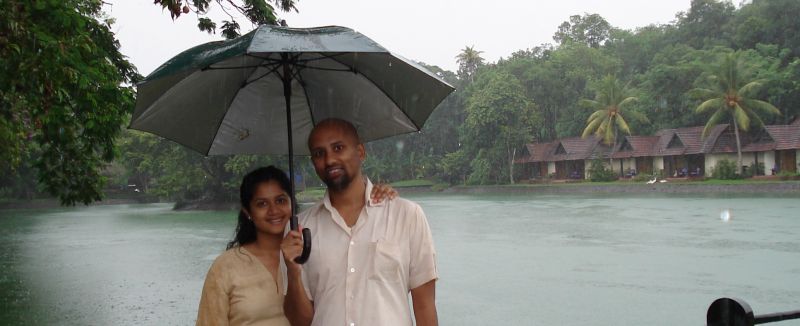
I definitely attribute my jump into India and working for Arghyam in Bangalore as fostered and encouraged by him. At the time I was at Yahoo! working as an Operations Analyst. I was like, “How can I just quit my job and move to India and work for a nonprofit? That’s crazy!” But I had seen him do it, and he definitely said, “If you want to go, you should go. You should not think about it. And this is the only time that you can do it.”
And it started making more sense to me. So there was definitely this safety and security in having this “partner in crime” in doing the work that we felt called to do. I would hear his stories about health care and Burundi, and he would hear about my stories in water and sanitation. We were ultimately trying to understand more of ourselves, and more of why there’s so much suffering in this world.
RB: How did you process taking that leap from a technology company into learning about water? What came up for you?
SS: I had been at Yahoo! for about two years as an Operations Analyst, which is basically a fancy term for somebody who produces reports on trends. When the earthquake in Haiti happened in 2010, I looked to my co-workers and asked, “Hey, what are we going to do about this? So many people—200,000 people—died and so many millions of people got displaced. What are we going to do?”
When I put that energy out there and noticed that nobody really felt compelled, I realized that there was something that I had that I needed to explore further.
Sitting in my tech job wasn’t going to solve that situation. I needed to go explore it, and just be okay with the fact that I’m not going to have a steady income. It’s not like I wasn’t paid at all—it wasn’t a volunteer job. I made sure that I would have some kind of income to support myself in India, and that was all that mattered.
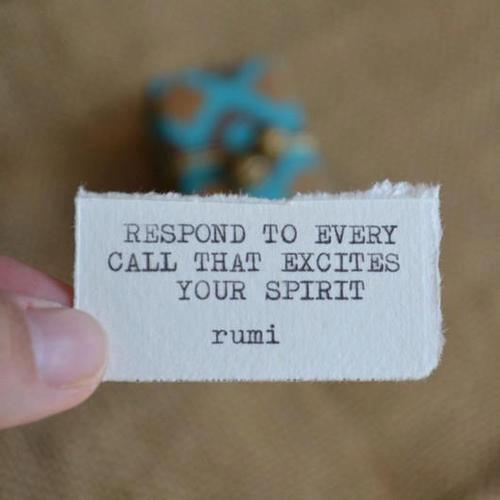
After Sri Lanka, I really wanted to see why people don’t have access to water and sanitation. Why is this such a big issue? There has to be a reason, and I want to know what that is. I want to see it with my own eyes.
So I just put the feelers out there. We had a contact in Los Angeles, and he put me in contact with his NGO friends in India, in Bangalore. And Bangalore happens to be the city that I’m from. So all these connections just started happening, and I contacted this NGO, Arghyam, in Bangalore, who fund water and sanitation projects domestically in India. And I just put it out there—I said, “I want to learn more about water and sanitation. I worked for Yahoo!, but I’m happy to come join you for a year.”
And I told my family that this is what I wanted to explore—this is what I felt drawn to after Sri Lanka, and it was important for me to go. And so they were asking the normal family questions of “How are you going to support yourself? How are you going to live?”
I said I’d figure it out once I got there.
And over a month or two, it just happened. I feel so grateful for that time there because it definitely answered a lot of questions that I had.
Sam: You spoke of fear, and I think it’s something that we all face in our life. What’s a practice that you’ve implemented in your own life to help you try to bring that fear down off the ledge so that you can grasp reality and get back to doing what you’re supposed to do?
 SS: The thing that I always sort of end up realizing at the end of something that I had been scared about is that everything always ends up being okay. And I try to consciously remember that in the beginning. Nothing ever happens that’s not supposed to happen— that’s not supposed to be in your life.
SS: The thing that I always sort of end up realizing at the end of something that I had been scared about is that everything always ends up being okay. And I try to consciously remember that in the beginning. Nothing ever happens that’s not supposed to happen— that’s not supposed to be in your life.
I also try to spend some time practicing gratitude, whenever I become aware of it. I feel like this is a good moment to just be thankful for where I am and what I’m doing, the freedom I’ve had, the house over my head.
RB: I want to dive into a little bit more about your current work at Seva Foundation. Can you tell us perhaps—give a quick tour of the history of Seva Foundation and then tell us more about what your specific role is right now there?
SS: Sure. Seva Foundation is a 35-year-old organization started by a group who had been compelled and inspired by Aravind and Dr. Venkateswamy’s calling for service in Madurai and Tamil Nadu. They decided after Dr. V’s model that they would start creating this community and camaraderie amongst eye care professionals, and focus on eye care as being a vehicle for service.
Because, the reality is, there are 285 million people that are blind, and about 80% of them are poor. To me, it’s sort of like this quiet issue that we don’t really talk about. In the developed world, it’s not in your face. You may see a few blind people here and there, but in the developing world, it is quite rampant. And for a poor family that may not have access to any care, you know being able to see again not only gives that person back their livelihood, but the person who’s been taking care of them their entire life also gets their livelihood and their life back. So when you restore vision for someone, it’s not only just one person—it’s two people, and potential an entire family.
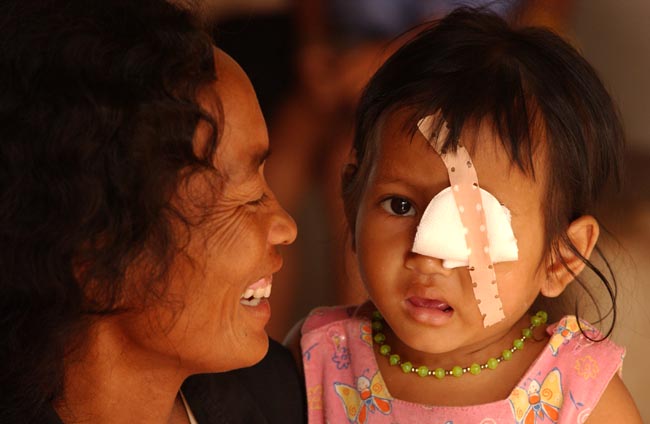
After I started learning more about Seva Foundation and what they did, I felt like it’s just such a compelling issue, and even though it wasn’t up my alley of water and sanitation, I realize it still gave me insight into issues that disproportionately affect the poor. So there’s no reason for me to not get involved.
We work with Toms Shoes, which is a company that basically believes in the model called “One for One”. If you buy a pair of shoes from Toms, they donate a pair of shoes to someone in the world. They’ve been doing this for the last five or six years, and as a result, they’ve donated and sold over 10 million pairs of shoes.
They just recently in the last few years started a sunglasses part of the program. And again, it’s in the “One for One” model, where if you buy a pair of sunglasses, Toms will give funding towards restoring someone’s sight or vision. And that goes through Seva Foundation. So my specific role is to manage this program with Toms, Seva Foundation, and all of our partners on the ground.

In learning about eye care and eye health, I’ve realized that the same communities that don’t have access to water and sanitation also don’t have access to eye care and eye health. And that was very compelling to me because it just added another piece to my pie of understanding development work and poverty.
Kanchan: What can we, as a community, do to support all the wonderful work that you’re doing?
SS: One thing that I’m completely inspired by is small acts. When I hear a small act of kindness, I just get such a huge smile on my face. I think that’s just so cool. So I would say continue to do small acts of kindness. That fuels me and that inspires me. So I’d love to hear about different small acts of kindness and how you’re able to engage in the world in that way.
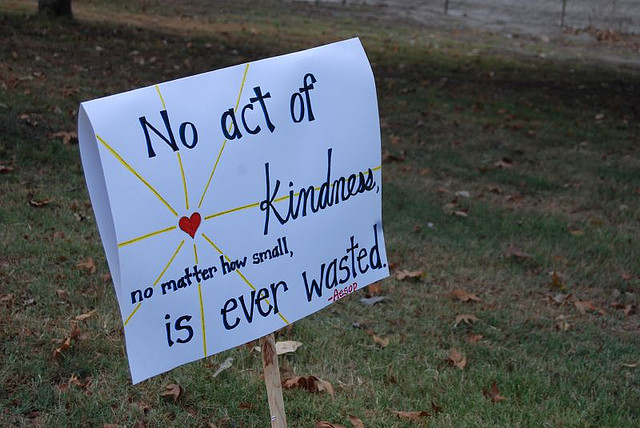
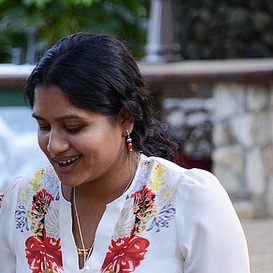 Based in San Francisco, CA, Shwetha continues to brighten the world through small acts of great love. More of her sights, sounds, and stories in her own words can be found on blog.
Based in San Francisco, CA, Shwetha continues to brighten the world through small acts of great love. More of her sights, sounds, and stories in her own words can be found on blog.
Posted by Audrey Lin on Aug 29, 2013



On Aug 30, 2013 Shwetha wrote:
Post Your Reply